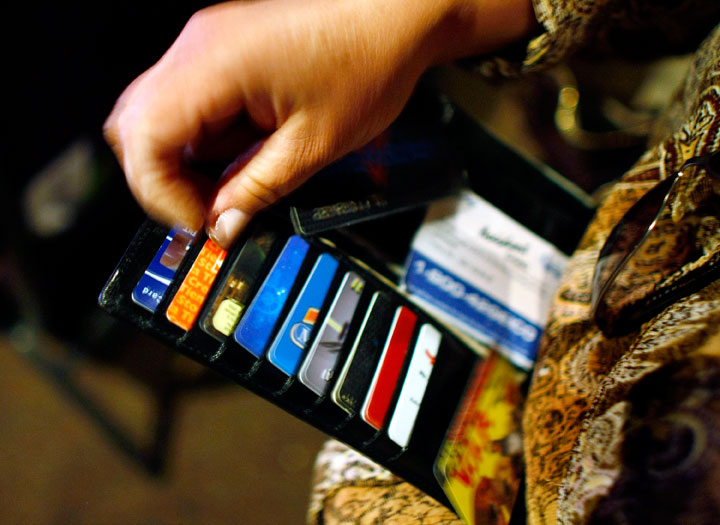TORONTO – Do you have credit card debt weighing you down? Do you often toss your credit card statement in the trash without paying off the balance? Turns out, you’re not alone.

Nearly half of all Canadian credit card holders (46 per cent) are carrying credit card debt, according to a report released Tuesday.
BMO’s 2015 Credit Card Report also showed that one in three don’t pay off their credit card bill every month.
The report found over half (52 per cent) use their credit cards to make the majority of their purchases. And yet one third (32 per cent) don’t actually keep track of their credit card charges until they receive their bill at the end of the month.
Experts say that Canadians’ love for ‘charging it’ is leading to a worrying cycle of debt.
One quarter (26 per cent) are stuck in a vicious cycle where they pay off their credit card bill with all their available funds, then rack up additional debt paying for other expenses.
“Credit cards are a popular payment tool for Canadians; however, unchecked spending habits can result in getting stuck in continuous monthly debt cycles that can hamper near and long-term financial goals,” said Nick Mastromarco, managing director of North American retail payments at BMO.
Break the cycle of debt
Growing consumer debt, paying for child care or post-secondary education, saving for retirement – these are just a handful of the things stressing out Canadian families.
An exclusive poll by Ipsos Reid for Global News found that one in three Canadians say credit card debt is a significant source of stress.
But how to pay it off isn’t always straightforward. If you have multiple credit cards and multiple debts, where do you start?
While some experts recommend paying off your debts with the highest interest levels first (also called “stacking”), others recommend paying off your card with the smallest balance first.
Regardless of what method you choose (there are pros and cons to each), in the end the best method is often the one that works best for you.
“Any strategy that goes beyond paying the minimum monthly payments is a step in the right direction,” said Jacob MacDonald from Consolidated Credit. The charity has a free online calculator that shows you how long it would take you to pay off your debt if you only paid the minimum balance on your cards. Credit Canada has a similar online debt calculator.
If you are struggling with paying off your debts on your own, you could seek out professional help from a counselling service or financial advisor. “People often are not comfortable talking to family or friends about their debt,” said Laurie Campbell, CEO of Credit Canada Debt Solutions, a non-profit charity, in an earlier interview with Global News.
READ MORE: How to choose a financial planner
You’ve paid off your credit card debt, now what?
Once you’ve paid off your outstanding credit card debt (congrats!), cut up those cards and start thinking differently about the role credit plays in your life.
The BMO report found that one quarter of Canadians view their credit cards as an additional source of spending money – that figure rises to 33 per cent for millennials.
“Staying realistic about spending habits and bill payments is key to effective management of credit card spending,” said BMO’s Mastromarco.
One way to stay realistic is to take a hard look at your income and expenses, and build a budget.
“Developing a detailed budget that incorporates everyday expenses and debt repayment helps provide a clear picture of your financial standing. Building in funds for contingency spending can help you stick to a plan and avoid getting discouraged,” said BMO in a release.
For expert advice on paying off your debt and saving for the future, click here.
Note: This feature is included for expository and informational purposes; it is not meant to be taken as personalized or expert financial advice.
Follow the conversation online at Globalnews.ca/smartmoney and on Twitter, #GNSmartMoney.





Comments